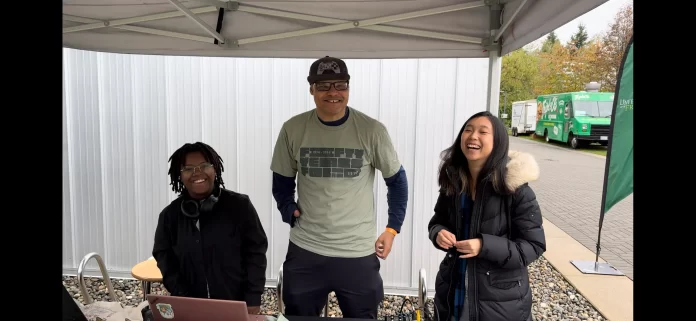CIVL Radio is Canada’s original number one campus radio station! Formerly “UCFV Campus and Community Radio Society,” the station has been in operation for 15 years serving both UFV and the Fraser Valley. The team at CIVL met with The Cascade to reflect on the station’s goals, projects, and student opportunities.
The radio station works toward engaging students in the community, helping to develop professional skills, growing cultural infrastructure in Abbotsford, and creating space for local and emerging artists to perform. According to Aaron Levy, CIVL’s station manager, if you’re interested in radio, you can find a place on the team.
“No matter who you are, if you’re interested, you can not only fit in, but you can shape the organization … it’s really exciting for me to see that over the years … if you’re interested, nothing will stop you as long as you have a good attitude, and you’re cooperative, and you understand that we’re all doing this together.”
The station also offers students full-time, paid co-op positions. One example of this is with Miyako Ando, CIVL’s Project Manager. For her, this involves scheduling shows and managing volunteer training sessions, among other things. These positions also provide students, like Jash Vashi, with volunteer opportunities to get involved in podcasts and shows, gaining work experience, and even the possibility of running their own radio show. As Levy explains, volunteers are a vital part of CIVL’s operations.
“We need volunteers for everything you can imagine for operating a non-profit organization, which includes finance, budget, administration, graphic design, and everything [else].”
CIVL is currently joined with Archway Community Services in an ongoing collaborative partnership project, for the Cultural Diversity Awards, where CIVL interviewed a number of the nominees, sharing their experiences and stories.
The station also hosts programs put together by students, such as Ando’s ZUBA ZUBA Trio — a radio show, in Japanese, featuring international students sharing their experiences in Canada. Another student-run program, started by Vashi, is Jammin with Jash, which runs every Tuesday at 1 p.m. — featuring South Asian music and highlighting underappreciated artists.
For Vashi, the campus radio station provides international students like him with support.
“People like Aaron, people like Stephen [Munga], people like Miyako, they make sure that we are okay. They also spread awareness … [and] motivate you to do good in the university.”
Stephen Munga, music director, elaborated on the importance of community radio stations.
“Campus and community radio is easily one of the most important government funded sectors … because it does so much for the marginalized people and the under-represented people, not just through music, but through community engagement [and] community events.”
It’s not always easy though; being a campus radio station has its challenges. CIVL is reliant on UFV’s utilities and facilities, and as CIVL continues to grow, that much needed infrastructure isn’t always there; with some in the organization feeling that the university doesn’t offer enough support — especially when the station depends on them for utilities and other necessities, as Levy laments.
“When the power goes out, we’re the last one anybody cares about … And I would maybe broaden it to say that that is emblematic and symptomatic of a broader problem, which is like what Stephen said, we want to build the infrastructure. Our biggest challenge is UFV’s infrastructure not being suitable for our needs as an organization.”
In the long-term, CIVL plans to launch 92.3 FM, by Apr. 1, expanding the station’s range from Hope to Tsawwassen. They have a documentary releasing on Apr. 5, that the Community Radio Fund of Canada gave $50,000 to produce. UFV 50 also contributed $5,000 to promote the film as part of the special anniversary celebrations.
In the future, the radio station wants to build annual UFV student bursary scholarships that will support media literacy and media studies — for, among others, women of colour — combating inequity and helping students achieve their goals through education.
“We’d like to be sending multiple students to school every year in the future with different identities and backgrounds to contribute to a richer and more effective media landscape.”



